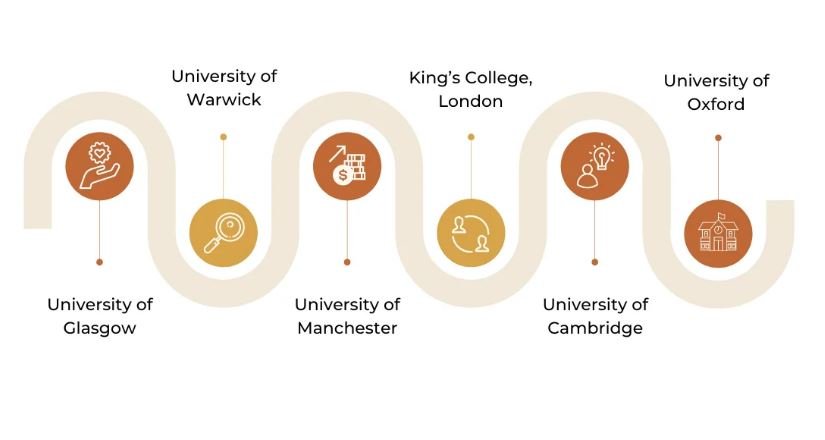Why Study in UK as a Student?
![]()
Studying in the UK as a Pakistani student can offer a range of benefits and opportunities. Here are some key reasons why studying in the UK is considered valuable for Pakistani students:
Academic Excellence: The UK is home to some of the world’s most prestigious and renowned universities. Institutions like Oxford, Cambridge, Imperial College London, and others consistently rank high globally for academic excellence and research output.
Diverse Range of Programs: UK universities offer a wide variety of academic programs across disciplines, allowing Pakistani students to choose from diverse fields of study and find programs that align with their interests and career goals.
International Recognition of Degrees: Degrees obtained from UK universities are globally recognized and respected. Having a UK qualification can enhance your international employability and open doors to career opportunities worldwide.
Cultural Diversity: Studying in the UK provides exposure to a rich and diverse cultural environment. Pakistani students can interact with peers from around the world, fostering cross-cultural understanding and networking opportunities.
Language of Instruction: English is the primary language of instruction in UK universities. For Pakistani students proficient in English, this eliminates language barriers and allows for seamless academic integration.
Research Opportunities: The UK is at the forefront of research and innovation. Pakistani students have the opportunity to engage in cutting-edge research across various disciplines and contribute to advancements in their respective fields.
Quality of Teaching: UK universities prioritize high-quality teaching, with a focus on interactive learning, critical thinking, and practical skills development. The education system emphasizes independent study and research.
Work Opportunities: The UK provides opportunities for international students, including Pakistani students, to work part-time during studies and full-time during scheduled breaks. After completing their studies, students may be eligible for post-study work opportunities.
Historical and Cultural Significance: The UK has a rich history and cultural heritage. Studying in the UK offers the chance to explore historic landmarks, museums, and cultural events, providing a unique and enriching experience.
Networking Opportunities: The UK provides a platform for networking and building connections with professionals in various industries. Many universities have strong ties with industry partners, creating opportunities for internships and collaborations.
Global Perspective: Studying in the UK exposes Pakistani students to a global perspective, helping them develop a broad worldview and understanding of different cultures and perspectives.
Post-Study Work Options: The UK has favorable post-study work options for international students, allowing them to stay and work in the country after completing their studies.
While these advantages make studying in the UK appealing, it’s essential for Pakistani students to carefully consider their academic and career goals, as well as the specific requirements of the programs and institutions they are interested in. Additionally, understanding visa regulations, financial considerations, and available support services is crucial for a successful study experience in the UK.
What are the Best Courses to Study in the UK?
![]()

The best course to study in the UK as a Pakistani student depends on your individual interests, career goals, and academic background. The UK offers a diverse range of high-quality academic programs across various disciplines. Here are some popular fields of study that Pakistani students often pursue in the UK:
Business and Management:Programs in business administration, management, finance, marketing, and international business are highly sought after. The UK is home to renowned business schools offering world-class education in these areas.
Engineering:The UK has a strong reputation for engineering programs, including civil engineering, mechanical engineering, electrical engineering, and aerospace engineering. These programs often integrate practical experience and innovative research.
Computer Science and Information Technology:Given the importance of technology, computer science and IT programs are popular choices. Specializations may include artificial intelligence, data science, cybersecurity, and software engineering.
Health Sciences and Medicine:The UK is known for its medical schools and health science programs. Medicine, nursing, pharmacy, physiotherapy, and public health are among the popular choices for Pakistani students interested in healthcare professions.
Law:UK law schools are well-regarded globally. Pakistani students often pursue LLB (Bachelor of Laws) or LLM (Master of Laws) degrees. UK law programs offer a comprehensive understanding of common law principles.
Social Sciences:Social sciences encompass a broad range of disciplines, including psychology, sociology, anthropology, and international relations. UK universities provide high-quality education in these fields.
Environmental Sciences and Sustainability:With a growing focus on environmental issues, programs in environmental sciences, sustainability, and ecology are gaining popularity. The UK is actively involved in research and initiatives related to environmental conservation.
Architecture and Design:UK institutions offer excellent programs in architecture, interior design, graphic design, and related fields. These programs often emphasize creativity, innovation, and practical skills.
Media and Communication:Programs in media studies, journalism, film studies, and communication are popular choices. The UK has a vibrant media industry, and students benefit from exposure to diverse media landscapes.
Art and Design:The UK has a strong tradition in the arts. Programs in fine arts, graphic design, fashion design, and illustration are available at leading institutions.
Economics and Finance:Economics and finance programs in the UK provide students with a solid foundation in economic theory, financial analysis, and quantitative skills.
International Development:Given the UK’s commitment to international development, programs in international relations, development studies, and global affairs are attractive for Pakistani students interested in addressing global challenges.
When choosing a course of study, consider factors such as the reputation of the institution, program accreditation, faculty expertise, and potential career outcomes. Research specific universities and their offerings, and don’t hesitate to reach out to educational advisors for guidance. Additionally, check the specific admission requirements for each program and university.
What are the Universities in UK?
![]()

The UK is home to numerous universities that offer a wide range of academic programs. Here are some of the well-known and reputable universities in the UK that Pakistani students may consider:
University of Oxford:Located in Oxford, England, the University of Oxford is one of the oldest and most prestigious universities in the world. It offers a wide range of undergraduate and postgraduate programs across various disciplines.
University of Cambridge:Similar to Oxford, the University of Cambridge, located in Cambridge, England, is renowned for its academic excellence. It offers a diverse range of programs and is particularly strong in science, engineering, and humanities.
Imperial College London:Imperial College London is known for its focus on science, engineering, medicine, and business. It consistently ranks among the top universities globally and is located in the heart of London.
London School of Economics and Political Science (LSE):LSE is a leading social science university located in London. It is known for its programs in economics, politics, sociology, law, and international relations.
University College London (UCL):UCL is a multidisciplinary university located in London. It offers a wide range of programs in areas such as arts, humanities, sciences, engineering, and social sciences.
University of Manchester:The University of Manchester is a Russell Group university known for its research output. It offers a diverse range of programs, including sciences, engineering, humanities, and business.
University of Edinburgh:Located in Scotland’s capital, the University of Edinburgh is known for its strong academic reputation. It offers programs in various disciplines, including arts, sciences, and humanities.
King’s College London:King’s College London is a research-intensive university located in the heart of London. It offers programs in health sciences, humanities, social sciences, and law.
University of Bristol:The University of Bristol is known for its research excellence and offers programs in science, engineering, social sciences, and arts. It is located in the southwest of England.
University of Warwick:The University of Warwick, located in Coventry, is known for its strong business and management programs. It also has a solid reputation in science, engineering, and social sciences.
University of Glasgow:Located in Scotland, the University of Glasgow is one of the oldest universities in the English-speaking world. It offers a wide range of undergraduate and postgraduate programs.
University of Birmingham:The University of Birmingham is known for its research impact and offers programs in areas such as business, engineering, humanities, and health sciences.
These are just a few examples, and there are many other reputable universities in the UK. When choosing a university, consider factors such as the specific program offerings, faculty expertise, research opportunities, campus facilities, and location. It’s advisable to thoroughly research each university and its programs to find the best fit for your academic and career goals.
Cost of Study in UK for Students
![]()
The UK is a multicultural country widely popular among Indian students. The UK is the second most-preferred country by students for overseas education. The cost is not too low, and a few things need to be considered before finalizing your decision. International students’ tuition fees vary highly depending on the course and the place of study. It can range from 9000 GBP – 38,000 GBP.
Study Programs
| S.no. | Degree | AVERAGE ANNUAL FEES (GBP) |
|---|---|---|
| 01 | UG | £10,000 – £38,000 |
| 02 | PG | £11,000 – £45,000 |
| 03 | Engineering | £11,880 – £23,760 |
| 04 | Medicine | £30,548 – £64,652 |
Cost of Living in UK?
![]()
Curious about the cost of living in the UK? No need to fret as you embark on your exciting journey. To ease your concerns, we offer valuable insights. All the mentioned expenses are on a monthly basis and should be considered separate from your tuition fees. When it comes to accommodation, you have two choices: university residence or private housing. Opting for university residency tends to be more economical. Additionally, student concessions, such as a railcard, can make transportation more affordable.

| S.No. | TYPE OF EXPENSE | AVERAGE COST IN GBP |
|---|---|---|
| 01 | Food | £150 to £250 |
| 02 | Accommodation | £400 to £800 |
| 03 | Personal Needs | £135 to £260 |
| 04 | Social Activities | £65 to £120 |
| 05 | Miscellaneous | £100 to £200 |
| 06 | Entertainment | £10 to £40 |
What are the Requirements to Study in UK?
![]()
- Undergraduate Programs: If you have to do your Bachelor’s in the UK, you must obtain at least 70-80% in your grade 12. Apart from that, the minimum score at IELTS should be 6.0.
- Postgraduate Programs: You will need at least 60% in your Bachelor’s in the field you have applied for. Also, the accepted CGPA in almost all the top universities is 6.5 or 7. The IELTS score should be 6.5-7, and the TOEFL score should be about 90-110.
- Doctoral Programs: To do a Doctoral Program in the UK, you would need at least 60% in your Master’s Degree. The IELTS score should be 7, TOEFL score 100, PTE score 66, CPE score 185, and CAE score 185.
- Diploma Programs: The eligibility for Diploma Programs would be the same as the English Language Proficiency Test. You may need to appear for tests like IELTS, TOEFL, PTE etc.
It should also be noted that these measures are all relative and will differ according to the course and university that you are applying to. Apart from these, you will need all the basic requirements like a student visa, DLI, documents etc.
What Exams are Required to Study in UK?
![]()
Most universities in the UK require international students, including those from Pakistan, to demonstrate proficiency in the English language. The commonly accepted English language proficiency tests are:
- IELTS (International English Language Testing System): This is one of the most widely accepted English proficiency tests. Universities may have specific score requirements, but a score of 6.0 to 7.5 on the IELTS scale is common for undergraduate and postgraduate programs.
- TOEFL (Test of English as a Foreign Language): Some universities accept TOEFL scores. A score of around 80 to 100 on the TOEFL iBT is often considered acceptable.
- PTE Academic (Pearson Test of English Academic): Another accepted English proficiency test. Universities may specify the required PTE Academic score.
- Duolingo English Test: Is accepted by many universities in the UK as an alternative to traditional English proficiency exams like TOEFL and IELTS. It evaluates a test taker’s abilities in reading, writing, listening, and speaking.
Additionally, keep in mind that the UK has a centralized application system for undergraduate programs called UCAS (Universities and Colleges Admissions Service). For postgraduate programs, you’ll typically apply directly to the university.
How to Study in the UK without IELTS?
![]()
It is possible to study in the UK without even attempting the IELTS. There are a few eligibility criteria to get into a university without IELTS. These will help you get an idea and reconsider things if you need to.
-
- If you have an excellent academic record.
- If you studied in an English medium school.
- A Skype interview with your university made you eligible.
- Taking other tests like TOEFL, CPE, PTE, Duolingo etc.
- Doing a pre-sessional course in English.
A few universities that do not give much importance to IELTS are Birmingham City University, University of Warwick, University of Bristol, Northumbria University etc.
Scholarship to Study in UK?
The UK provides many scholarships for international students, and they can be categorised based on your course and university. A few scholarships provide you with a specific amount of money every year or the first year alone. Some other scholarships cover your tuition fees wholly or partially, so you need not worry about your course fees much.
| S.no. | SCHOLARSHIP | DETAILS | AMOUNT AWARDED (GAP) |
|---|---|---|---|
| 01 | Government Scholarships | The amounts can vary, and eligibility criteria are set by the respective governments | 50-100% off on tuition fees |
| 02 | University Scholarships | Include additional financial support for living expenses specific amount will depend on the university’s policies and the type of scholarship | 50-100% off on tuition fees |
| 03 | External Scholarships and Foundations | The amounts can vary, and eligibility criteria are set by the respective governments | |
| 04 | Subject-Specific Scholarships: | May cover a significant portion of the tuition fees or provide additional financial support | |
| 05 | Scotland’s Saltire Scholarships | The scholarship is offered to Master’s students in science & related courses | 8000 GBP |
| 06 | Transform Together Scholarships for International and European Union (non-UK) Students | All full-time UG & PG students are qualified | 50% off on tuition fees |
| 07 | Nottingham Developing Solutions Scholarships | 105 Master’s students of any discipline will be eligible for this scholarship | 50-100% off on tuition fees |
| 08 | UCL Global Masters Scholarships for International Students | 70 students doing their Master’s Degree will be eligible | 15,000 GBP |
| 09 | Allan & Nesta Ferguson Charitable Trust Masters Scholarships at University of Sheffield | All PG students at the University of Sheffield will be qualified to have this scholarship | 100% off on tuition fees |
| 10 | UWE Millennium Scholarship for International Students | Students pursuing the eligible PG programs will stand a chance to get it | 50% off on tuition fees |
| 11 | The Glenmore Medical Postgraduate Scholarship at the University of Edinburgh | Both full-time and part-time students at the University of Edinburgh are eligible | 100% off on tuition fees |
| 12 | Eira Francis Davies Scholarship at Swansea University | Students pursuing their PG degrees in Medicine are eligible | 100% off on tuition fees |
| 13 | Glasgow International Leadership Scholarships | All Master’s students at the University of Glasgow will be eligible | 10,000 GBP |
UK Student Visa
![]()
The UK stands as a top choice for many international students, reaffirmed by consistently high applicant and student intake numbers even in the post-pandemic era. The presence of numerous world-class universities contributes significantly to the widespread popularity that the country continues to enjoy as a premier destination for education.

Climatic Conditions
![]()
Situated on the Atlantic coast of Florida, the UK experiences considerably higher temperatures, accompanied by an increased frequency of rainy days. The climate is influenced by the Atlantic currents, resulting in rainfall during the summer months. Although spring is the driest period, autumn brings the potential for unpleasant hurricanes. The region is characterized by a tropical climate.

Future Intakes
![]()
In the UK, the academic year is divided into three main terms or semesters, and universities typically have multiple intakes throughout the year. The two main types of intakes are:
-
September Intake (Autumn/Fall):The September intake is the most common and widely recognized intake for academic programs in the UK. Many undergraduate and postgraduate programs start in September. This is considered the main intake, and it aligns with the beginning of the academic year.
-
January Intake (Winter/Spring):The January intake is also significant, especially for postgraduate programs. While fewer programs may be available in January compared to September, it provides an opportunity for students to start their studies in the middle of the academic year.
Some universities may offer additional intakes, such as:
- February or March Intake:Some universities offer a February or March intake for specific programs. However, this is less common than the September and January intakes.
It’s important to note that the availability of intakes can vary by university, program, and level of study. Additionally, certain programs, especially those with practical components like laboratory work or clinical placements, may have limited intakes.
For Pakistani students planning to study in the UK, it’s advisable to check the specific intake options for their chosen program and university. The official website of the university and the admissions office will provide information about available intakes, application deadlines, and admission requirements.
In summary, the two primary intakes for Pakistani students in the UK are in September and January, with additional intakes offered by some universities. Students should plan their application timelines accordingly based on their preferred intake and the specific requirements of their chosen program.
